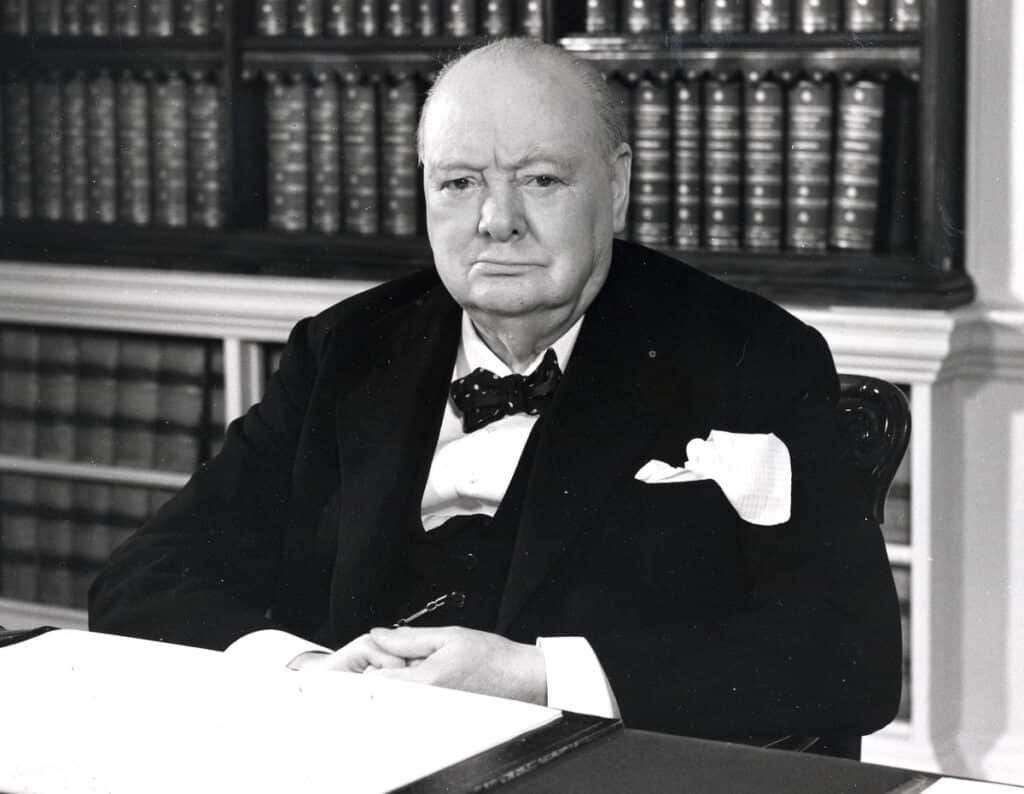Si tu t’intéresses à l’aire britannique, ce discours de Churchill est fait pour toi ! Figure de proue de la résistance, ce politicien avait des talents oratoires notables qui peuvent être très intéressants à analyser. Dans cet article, Major-Prépa te propose donc de regarder de plus près le texte que Churchill a prononcé en 1940, lorsqu’il est devenu Premier ministre.
Discours de Churchill
Pour commencer, voici le document en question.
“Blood, Toil, Tears and Sweat”: Winston Churchill’s First Speech as Prime Minister to House of Commons (May 13, 1940)
On Friday evening last I received His Majesty’s commission to form a new Administration. It is the evident wish and will of Parliament and the nation that this should be conceived on the broadest possible basis and that it should include all parties, both those who supported the late Government and also the parties of the Opposition. I have completed the most important part of this task. A War Cabinet has been formed of five Members, representing, with the Opposition Liberals, the unity of the nation. The three party Leaders have agreed to serve, either in the War Cabinet or in high executive office. The three Fighting Services have been filled. It was necessary that this should be done in one single day, on account of the extreme urgency and rigour of events. A number of other positions, key positions, were filled yesterday, and I am submitting a further list to His Majesty to-night. I hope to complete the appointment of the principal Ministers during to-morrow. The appointment of the other Ministers usually takes a little longer, but I trust that, when Parliament meets again, this part of my task will be completed, and that the administration will be complete in all respects.
I considered it in the public interest to suggest that the House should be summoned to meet today. Mr. Speaker agreed, and took the necessary steps, in accordance with the powers conferred upon him by the Resolution of the House. At the end of the proceedings today, the Adjournment of the House will be proposed until Tuesday, 21st May, with, of course, provision for earlier meeting, if need be. The business to be considered during that week will be notified to Members at the earliest opportunity. I now invite the House, by the Motion which stands in my name, to record its approval of the steps taken and to declare its confidence in the new Government.
To form an Administration of this scale and complexity is a serious undertaking in itself, but it must be remembered that we are in the preliminary stage of one of the greatest battles in history, that we are in action at many other points in Norway and in Holland, that we have to be prepared in the Mediterranean, that the air battle is continuous and that many preparations, such as have been indicated by my hon. Friend below the Gangway, have to be made here at home. In this crisis I hope I may be pardoned if I do not address the House at any length today. I hope that any of my friends and colleagues, or former colleagues, who are affected by the political reconstruction, will make allowance, all allowance, for any lack of ceremony with which it has been necessary to act. I would say to the House, as I said to those who have joined this government: “I have nothing to offer but blood, toil, tears and sweat.”
We have before us an ordeal of the most grievous kind. We have before us many, many long months of struggle and of suffering. You ask, what is our policy? I can say: It is to wage war, by sea, land and air, with all our might and with all the strength that God can give us; to wage war against a monstrous tyranny, never surpassed in the dark, lamentable catalogue of human crime. That is our policy. You ask, what is our aim? I can answer in one word: It is victory, victory at all costs, victory in spite of all terror, victory, however long and hard the road may be; for without victory, there is no survival. Let that be realised; no survival for the British Empire, no survival for all that the British Empire has stood for, no survival for the urge and impulse of the ages, that mankind will move forward towards its goal. But I take up my task with buoyancy and hope. I feel sure that our cause will not be suffered to fail among men. At this time I feel entitled to claim the aid of all, and I say, “come then, let us go forward together with our united strength.”
Questions
Pour guider ta réflexion, tu trouveras ci-dessous une liste de questions à propos de ce document.
1) Introduce the text. What type of source is it? What do you know about the author? Was he popular? Was he known for his speeches? Who was the target audience? What was the occasion?
2) What is Churchill’s immediate task? How does he want to proceed? Why does he need to address the House of Commons, and how does he do it? Is he formal, informal, solemn? Does he use long and complicated sentences? Is it a long speech? Why (not)? How does he justify himself?
3) In the second half of the text, who is Churchill really addressing? Is it just the house of Commons? What is he trying to do and how? What rhetorical devices hoes he use to achieve his objective?
4) What image does Churchill try to give of himself as a leader? What style of leadership is he offering the nation? Is he going to make himself popular by offering “tears and sweat”?
5) Conclude: Was this speech successful? Do you find it convincing? How was is a turning point in history?
Les sections qui suivent répondent chacune à l’une de ces questions. Assemblées, ces réponses forment un commentaire de texte analytique sur le discours de Churchill. Chaque étape est commentée et décortiquée en français pour que tu comprennes bien la méthodologie employée et que tu puisses t’inspirer de ce corrigé pour tes futurs travaux.
1) Introduction
Churchill was a British statesman who served as Prime Minister of the United Kingdom from 1940 to 1945, during the Second World War, and again from 1951 to 1955. This towering figure in British history, stands as a symbol of resilience and defiance in the face of adversity. His leadership as Prime Minister during the Second World War cemented his reputation as a wartime hero. In this primary-source speech, he informs the population of the political strategy adopted for the Second World War. The document thus offers a valuable window into Churchill’s approach to mobilizing the British people during a time of existential crisis. While the speech undoubtedly informs the public of the adopted war strategy, a closer look reveals a more nuanced message. Churchill, the consummate orator, weaves elements of both idealism and pragmatism throughout his address. On the one hand, he may appear to offer a stirring vision of a brighter future, potentially aligning with the characteristics of an idealistic leader. However, this optimism is tempered by a stark acknowledgment of the sacrifices demanded. The famous phrase “blood, toil, tears and sweat” presents a reality far from rosy. This raises a compelling question: is this speech ultimately an idealistic rallying cry or a pragmatic address grounded in the harsh realities of war? By analyzing the content and delivery of Churchill’s words, we can delve deeper into the complex persona of the wartime leader and the message he sought to convey to the British people. The following sections will explore this question through three key lenses: the speech’s informative nature, its targeted audience, and its underlying pragmaticism.
Analyse de l’introduction
Cette introduction suit une démarche en trois étapes pour analyser le discours de Churchill : contextualisation, problématisation et annonce du plan. Premièrement, la source est présentée et contextualisée. Churchill est très connu, et son importance historique vaut le coup d’être mentionnée ici. On est en pleine Seconde Guerre mondiale, la population est anxieuse et le rôle du Premier ministre est d’informer et de rassurer. Et justement, en posant ces informations, tu peux te rendre compte que le discours de Churchill déroge un peu à cette règle : il ne rassure pas vraiment la population lorsqu’il ne leur promet que de la sueur, du sang et des larmes… C’est donc un très bon élément de problématisation ! Churchill est dès lors moins idéaliste que pragmatiste, ou, en d’autres termes, réaliste.
Au niveau de la méthode de l’introduction, tu peux donc retenir qu’il est intéressant :
- de présenter succinctement l’auteur et le contexte historique du document ;
- de situer le type de document (discours, article, etc.) et le type de source (primaire, secondaire) ;
- d’évoquer l’objectif apparent du document ;
- d’identifier des éléments qui suggèrent une analyse plus approfondie ;
- de formuler une question centrale qui oriente la lecture ;
- d’annoncer le plan du commentaire.
2) An informative speech
The weight of history hangs heavy on the opening section of Winston Churchill’s wartime speech. As Britain grapples with the escalating conflict, Churchill finds himself thrust into the role of Prime Minister, tasked with forming a new administration amidst the chaos. This pressing reality permeates his address, shaping both his tone and his message.
The language itself betrays the urgency of the situation. Churchill utilizes short, clipped sentences, exemplified by his opening, “I hope I may be pardoned if I do not address the House at any length today”. This brevity stands in stark contrast to the more leisurely pace one might expect from a leader embarking on a new term. Instead, Churchill conveys a sense of relentless forward momentum, mirroring the relentless nature of the war itself.
Furthermore, a subtle shift in tone reveals Churchill’s emerging leadership style. He employs a more authoritative air than a cordial one: “I considered it in the public interest to suggest that the House should be summoned to meet today”. The emphasis here lies not on seeking permission, but on fulfilling a duty dictated by the public good. Churchill presents himself as a leader who speaks plainly, eschewing flowery language in favor of direct action. The public interest becomes his primary justification, a stark reminder of the extraordinary circumstances demanding his leadership.
Through his concise language and assertive tone, Churchill establishes himself not as a traditional politician, but as a leader forged in crisis. He prioritizes efficiency and decisive action, leaving little room for pleasantries or political maneuvering. The weight of the war is palpable, and Churchill wastes no time in confronting it head-on.
Analyse de la première partie
Dans cette partie, on remarque que le discours de Churchill est, certes, informatif, mais surtout qu’il emploie un ton assez étonnant, que l’on a pas l’habitude d’observer en politique. Il est assez directif et ne fait pas de langue de bois. On remarque que dans cette première partie, le contexte historique est posé et exploité d’emblée : Churchill devient Premier ministre en pleine crise de la guerre.
L’urgence de cette situation se reflète d’ailleurs dans le message de Churchill. Il utilise des phrases courtes et sèches pour transmettre ce sentiment d’urgence. En outre, le ton est autoritaire plutôt que cordial car Churchill met l’accent sur son devoir et l’intérêt public, évitant les fioritures et privilégiant la franchise. Ce style direct et affirmé montre donc qu’il se présente comme un chef en temps de crise, privilégiant l’efficacité et l’action concrète.
3) A multi-targeted speech
Churchill’s address, however, proves to be more than just a terse communication to his colleagues in Parliament. The latter portion of the speech reveals a strategic shift in target audience. He transitions from addressing the immediate concerns of the House of Commons to a broader message directed at the entire British population.
This shift is marked by a deliberate change in tone and rhetorical devices. Churchill’s earlier focus on brevity and directness gives way to a more rallying style. He employs powerful anaphoras, such as “we have before us an ordeal of the most grievous kind” to create a sense of shared struggle and determination. This technique, famously used by later figures such as Martin Luther King Jr. and Barack Obama, serves a specific purpose. The repetition creates a rhythm and memorability that resonates with the audience. In Churchill’s case, it becomes a tool for uniting the British people in the face of adversity. The same remark can also be formulated about the choice of pronouns: Churchill resorts to the inclusive pronoun “we”.
Churchill therefore transcends the confines of Parliament and speaks directly to the hearts and minds of the citizenry. He aims to not only inform, but also to inspire, to forge a collective spirit of resilience in the face of a seemingly insurmountable challenge. This deliberate shift in audience and rhetorical strategy underscores Churchill’s understanding of the power of communication in wartime. He recognizes the need to not just manage the political landscape, but to galvanize the entire nation for the fight ahead.
Analyse de la deuxième partie
Cette deuxième partie va un peu plus loin dans l’analyse et remarque que le discours de Churchill ne se limite pas à un simple échange avec ses collègues parlementaires. Il y a en fait un changement stratégique de public cible : Churchill s’adresse désormais à toute la population britannique. Ce passage vise à informer mais aussi à inspirer et à unir le peuple. C’est donc un peu idéaliste, mais dans une moindre mesure.
Au niveau formel, Churchill abandonne la brièveté et la franchise du début pour adopter un style plus mobilisateur. Il utilise des figures de style comme l’anaphore pour créer un sentiment de lutte commune et de détermination. Ces répétitions rythment le discours et le rendent plus mémorable pour l’audience. En employant ces procédés, Churchill sort du cadre parlementaire, il cherche non seulement à gérer la situation politique, mais aussi à galvaniser la nation entière pour le combat à venir.
4) Churchill’s pragmaticism
Churchill does not try to be popular. He provides the House (and the population) with direct, factual information, which is characteristic of pragmatic leaders. Conversely to idealism, pragmaticism is aimed at creating an impression of directness and truthfulness between a leader and his addressees. It is exactly what Churchill does when offering “tears and sweat” to his country. He eschews empty promises and platitudes, a hallmark of idealistic leadership. Instead, he prioritizes directness and factual information, a quality often associated with pragmatic leaders.
The stark imagery employed by Churchill leaves no room for illusions. He paints a brutally honest picture of the sacrifices that lie ahead, a stark contrast to the sugar-coated promises of a swift and painless victory. This approach, while potentially lacking in inspirational grandeur, serves a critical purpose. By grounding his message in reality, Churchill establishes himself as a leader who is honest and trustworthy, qualities essential for maintaining public morale during a conflict.
Churchill’s pragmatism extends beyond mere honesty. It reflects a deep understanding of the challenges at hand and a willingness to confront them. He recognizes that victory will not be achieved through wishful thinking, but through unwavering commitment and collective action. By presenting a clear-eyed assessment of the situation, Churchill lays the foundation for a national effort fueled not by naive optimism, but by a shared determination to overcome adversity.
Analyse de la troisième partie
Bien que la partie précédente mette en avant le côté idéaliste du discours, c’est bien le pragmatisme qui domine. Churchill privilégie la franchise en informant la population des difficultés à venir. Il évite les promesses creuses et les discours idéalistes, préférant présenter la réalité crue de la situation.
Cette approche vise à établir sa crédibilité, ce qui est essentiel pour maintenir le moral pendant un conflit prolongé. Pour cette raison, le discours de Churchill est dénué de fioritures et se base sur des images fortes pour marquer les esprits. En exposant sans détour les difficultés, il augmente sa crédibilité et pose les bases d’un effort national fondé sur la détermination collective et non sur un optimisme naïf.
5) Conclusion
All in all, the power of Churchill’s speech lies in its honesty and focus on unity. By shunning political spin and empty promises, Churchill cultivates an air of truthfulness that resonates with the audience. This directness likely fostered a sense of trust in the new Prime Minister, a crucial quality during a time of national peril. Furthermore, his repeated emphasis on shared sacrifice – the “blood, toil, tears and sweat” – binds the nation together. This singular focus on a common enemy and a common goal serves as a potent motivator, marking the address as a powerful call for national unity. While the speech unflinchingly confronts the grim realities of war, it doesn’t wallow in despair. Churchill, the consummate pragmatist, avoids dwelling solely on the problems. Implicitly, he offers solutions – the relentless pursuit of victory through unwavering commitment and collective action. This realism demonstrates the power of clear-eyed leadership in times of crisis. Churchill does not shy away from the truth, but he uses it to galvanize, not demoralize. The speech thus serves not only as a historical document, but as a timeless reminder of the power of clear communication and unwavering resolve in the face of seemingly insurmountable odds.
Analyse de la conclusion
La force de cette conclusion de commentaire repose sur quatre points méthodologiques : premièrement, la problématique est rappelée et on y répond ; ensuite, les arguments sont synthétisés et reliés à la problématique ; enfin, une ouverture sur un sujet plus large est formulée à la fin. Somme toute, on peut dire que la force du discours de Churchill réside dans sa franchise et dans son message d’unité. Il cultive une authenticité qui inspire confiance, et l’accent est mis sur le sacrifice partagé qui unit la nation.
Bien que la situation soit difficile, le discours propose des solutions : le Premier ministre ne s’apitoie pas sur son sort et privilégie l’engagement collectif. En ouverture, tu peux noter que le pragmatisme est une technique politique qui a traversé les époques depuis Churchill et qu’aujourd’hui encore, certains dirigeants s’en inspirent. Pense par exemple à certains discours de Nixon ou, plus récemment, à ce qu’a pu dire Emmanuel Macron au moment de la Covid.
Tu connais dorénavant tous les détails de la rhétorique de Churchill et tu peux t’inspirer de ce commentaire de texte corrigé pour tes travaux, essais et colles d’anglais ! Petit tip supplémentaire : tu peux embellir tes rédactions à l’aide de citations, et Major-Prépa t’a concocté une fiche qui en liste et explique trente.













